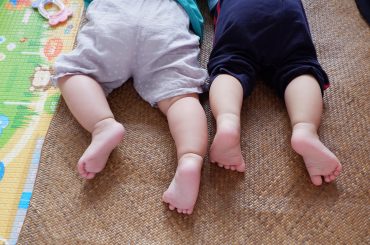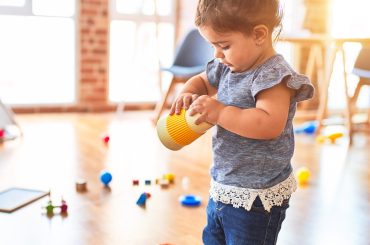As parents, we often wonder when our babies will start to hit developmental milestones, including when they can start playing with toys such as blocks. Block play is an important activity for babies, as it can help them develop skills such as hand-eye coordination, fine motor skills, and problem-solving abilities. But at what age is it appropriate to introduce babies to blocks? In this article, we will explore when babies can start playing with blocks, the benefits of block play, and how parents can facilitate safe and enjoyable block play for their little ones.
Contents
 When Babies can start Playing with Blocks?
When Babies can start Playing with Blocks?
Babies can start playing with blocks as early as six months old. At this age, babies are beginning to develop their hand-eye coordination and their ability to grasp objects, so they may enjoy picking up and exploring different types of blocks.
As they grow, their block play can become more sophisticated, and they may start stacking, sorting, and engaging in imaginative play with their blocks. Block play is an important activity for babies, as it can help them develop a range of skills and abilities that will serve them well as they continue to grow and learn. However, it’s important to choose blocks that are safe for babies to play with and to supervise them during play to ensure their safety.
The Ages Babies play with Blocks
Babies can start playing with blocks as early as 6 months old. At this age, babies can grasp and hold onto objects, including blocks, and may begin to explore the textures and shapes of the blocks.
As babies approach 9-12 months, they may begin to engage in more intentional block play, such as stacking and knocking over blocks. They may also start to learn about cause and effect as they build and knock down their block structures.
Between 12-18 months, babies’ block play may become more complex as they start to use their imaginations and create more intricate block structures. They may also begin to sort and categorize blocks by color, shape, and size.
Between 18-24 months, babies’ block play may involve more cooperative play with others, such as building structures together and engaging in pretend to play with the blocks.
 The Benefits of Block Play
The Benefits of Block Play
- Develops fine motor skills: Playing with blocks requires the use of small muscles in the hands and fingers, which helps babies develop their fine motor skills and hand-eye coordination.
- Enhances cognitive development: Building with blocks can help babies develop their problem-solving and spatial reasoning skills. As they figure out how to stack blocks and create structures, they are also developing their ability to think critically and creatively.
- Fosters language development: Block play can also help babies develop their language skills. As they engage in block play, they may describe what they are building, name the colors and shapes of the blocks, and engage in conversation with others.
- Encourages social interaction: Block play can be a social activity, as babies may engage in cooperative play with others, sharing blocks and working together to build structures.
- Provides sensory stimulation: Playing with blocks can provide babies with sensory stimulation as they explore the textures, shapes, and colors of the blocks.
How Parents can Facilitate Safe and Enjoyable Block for their Little ones
- Choose safe blocks: Make sure to choose blocks that are appropriate for your baby’s age and developmental stage. Avoid blocks with small parts or sharp edges that could be a choking hazard or injure your baby. Soft blocks or wooden blocks with rounded edges are good options for young babies.
- Supervise play: Always supervise your baby during block play to ensure their safety. Stay nearby and provide assistance if needed, especially if your baby is still learning to sit up or crawl.
- Provide a variety of blocks: Offer a variety of blocks in different shapes, sizes, and colors to keep your baby engaged and interested in block play. This can also help your baby learn to sort and categorize objects.
- Encourage creativity: Allow your baby to explore and play with the blocks in their own way. This can help foster their creativity and problem-solving skills. Avoid directing their play too much or interrupting their play too frequently.
- Play together: Block play can be a great opportunity for you to bond and play with your baby. Join in on the block play, show your baby how to stack blocks, or encourage them to create something with the blocks.
- Keep the play area safe: Make sure the play area is free from any potential hazards or distractions. Remove any loose rugs, sharp corners, or other dangerous objects that could be a safety hazard. Ensure that the area is well-lit and well-ventilated.
 So, When can Babies play with Blocks?
So, When can Babies play with Blocks?
In conclusion, block play is an important activity for babies that provides numerous benefits for their physical, cognitive, and social-emotional development. It promotes physical development, enhances cognitive development, fosters language development, encourages social interaction, and provides sensory stimulation.
Parents can facilitate safe and enjoyable block play for their little ones by choosing safe blocks, supervising play, providing a variety of blocks, encouraging creativity, playing together, and keeping the play area safe. By incorporating block play into their baby’s daily routine, parents can support their baby’s growth and development while also providing an engaging and enjoyable play experience.
Want to know at what age babies smile? Read it here.





